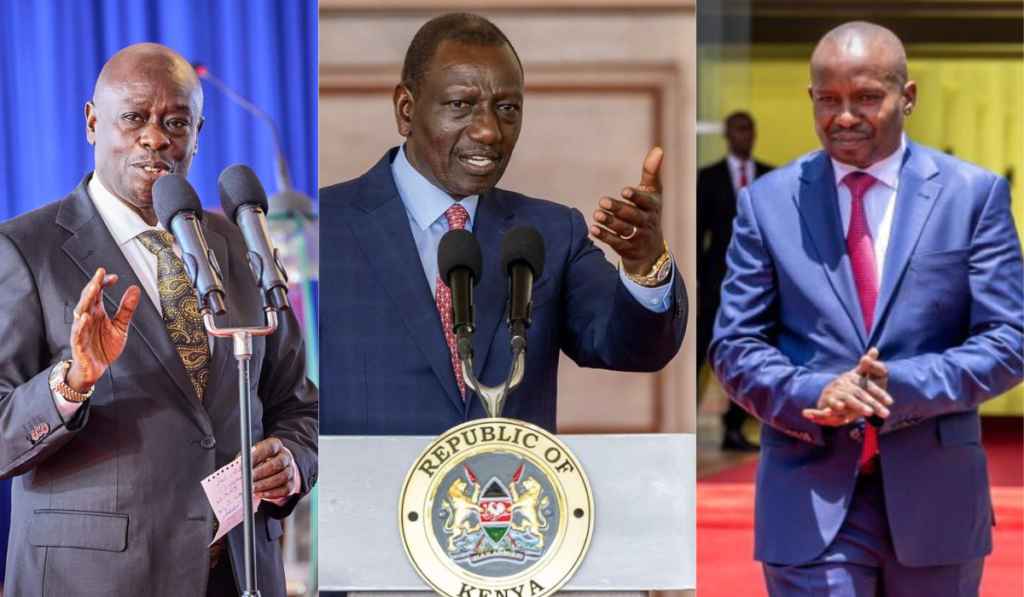
The impeachment of Kenya’s Deputy President, Rigathi Gachagua, followed by the swearing-in of Professor Kithure Kindiki as the new Deputy President on November 1, 2024, presents a compelling case for examining Kenya’s political landscape through the lens of securitization theory, as articulated by the Copenhagen School. This article considers the political maneuvers leading to Gachagua’s removal, where his alleged misconduct was framed as a national security threat, legitimizing extraordinary measures. This securitization process underscores broader implications for Kenya’s governance, political stability, and public opinion.
Theoretical Framework: Securitization Theory
In Security: A New Framework for Analysis (1998), Buzan, Waever, and de Wilde argue that securitization is not an objective state but a strategic process where issues are declared as existential threats, necessitating immediate, extraordinary measures. Through a “speech act,” a securitizing actor frames a matter as a threat to a referent object (e.g., national security), seeking acceptance from the public and other authorities to justify exceptional actions.
Application to Gachagua’s Impeachment
Kenya’s 2010 Constitution outlines strict grounds for the removal of a Deputy President, including mental or physical incapacity, violations of the Constitution, serious crimes, or gross misconduct (Article 150). The impeachment process involves initial proceedings in the National Assembly, advancing to the Senate for a conclusive vote. If successful, Article 149 requires the President to nominate a successor, pending National Assembly approval.
The October 2024 impeachment of Deputy President Rigathi Gachagua was marked by unprecedented allegations, including corruption, incitement of ethnic divisions, and endorsing anti-government protests among youth. President Ruto’s allies framed these accusations as security threats, casting Gachagua’s actions as undermining institutional integrity and national cohesion. This positioning transformed the discourse from routine political debate to a matter of state security, justifying the extraordinary measure of impeachment.
Judicial Interventions, Public Engagement and Legislative Action
For securitization to succeed, it requires public and legislative backing. Historic levels of public discourse and participation revealed high engagement nationwide, reflecting widespread acceptance of the perceived threat. This support set the stage for legislative action: the National Assembly voted overwhelmingly in favor of impeachment, demonstrating broad consensus that Gachagua’s actions posed substantial risks warranting removal.
The judiciary played a critical role in the impeachment’s legal trajectory. Initially, conservatory orders paused the proceedings, underscoring the judiciary’s duty to uphold constitutional processes. However, on October 31, the Milimani High Court lifted these orders, facilitating Kindiki’s swearing-in and signaling a judicial endorsement of maintaining executive functionality. Concurrently, President Ruto appointed Musalia Mudavadi as the acting Cabinet Secretary, filling Kindiki’s former position, and announced a public holiday for Kindiki’s inauguration.
The judiciary’s swift handling of the impeachment proceedings has elicited mixed reactions. Critics argue that this move, while constitutionally sound, is perceived as a consolidation of power, which sidelines potential avenues for legal challenges at the Supreme Court. Supporters view the expedited decisions as a commitment to constitutionalism, ensuring governmental continuity. Critics, again, argue that the rapid pace suggests potential influence by the executive branch, risking public trust in judicial independence. Supporters contend that declaring a public holiday for Kindiki’s swearing-in highlights the administration’s intent to swiftly stabilize the executive branch.
Political Implications and Public Perception of Presidential Leadership
The securitization of Gachagua’s alleged misconduct has significant political repercussions. Framing his actions as security threats facilitated his removal, consolidating power within the executive branch. Many citizens, including Kenyan Americans, support Gachagua’s removal, aligning it with aspirations for ethical governance, while others perceive the process as politically motivated, raising concerns over fairness and transparency. The impeachment has catalyzed protests in some parts of the country, underscoring the contentious nature of the issue. These divisions underscore the difficulties of achieving broad acceptance, a critical factor for effective securitization. Analyzing Kindiki’s appointment through an ethnic lens further emphasizes concerns over inclusivity, signaling that public reactions will shape expectations around governance and accountability for the foreseeable future.
Professor Kindiki’s appointment marks a pivotal moment in Kenya’s political landscape. Known for his expertise in law, Kindiki served as President Ruto’s defense counsel during the ICC proceedings related to the 2007–2008 post-election violence in Kenya. His subsequent role as Interior Minister showcased his capability in handling national security, positioning him as a strategic choice for Deputy President.
Kindiki’s appointment can potentially rebalance ethnic and regional representation within the government. His elevation could enhance executive cohesion and address inclusivity concerns, given his Tharaka-Nithi County origins. His experience as a former Senate Majority Leader and Deputy Speaker may also streamline legislative-executive interactions, promoting policy implementation. His background in international law and the ICC could strengthen Kenya’s engagement with global legal frameworks and reinforce commitments to upholding the rule of law.
The impeachment and subsequent replacement of Gachagua reflect divergent perceptions of President Ruto’s leadership. Some interpret his endorsement of Gachagua’s removal as evidence of intolerance for internal dissent, potentially limiting debate within his administration. Others argue that the impeachment underscores a commitment to integrity and accountability. This balancing act between decisive action and inclusivity shapes public perception of Ruto’s leadership and will influence his legacy.
Broader Implications for Governance
The interplay between Kenya’s judiciary and executive reveals the delicate power balance within the governance framework. As a check on executive power, the judiciary is essential to constitutional order. However, perceptions of political influence within judicial decisions risk eroding public confidence in legal institutions. Transparency and impartiality in judicial actions are crucial to reinforcing the judiciary’s role as an independent arbiter. Equally, the executive’s respect for judicial processes is vital to upholding Kenya’s democratic frameworks, principles, and the separation of powers. Both institutions must prioritize transparency and impartiality to bolster public confidence and defend democratic governance.
